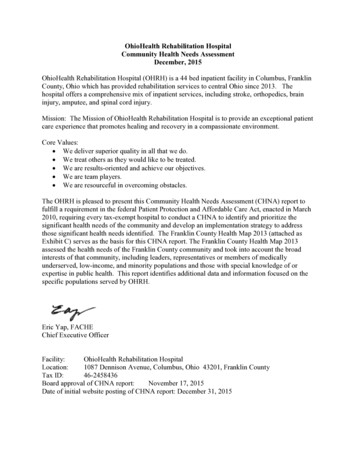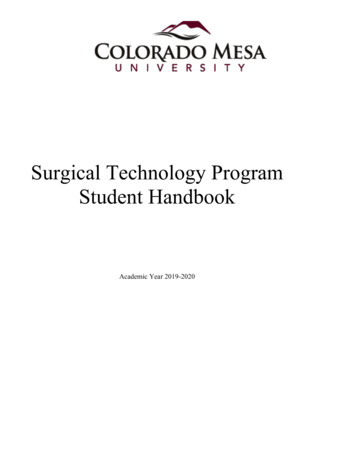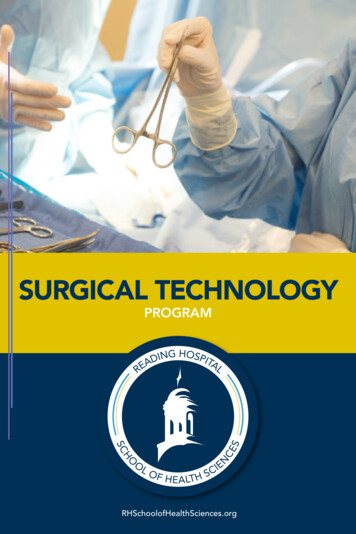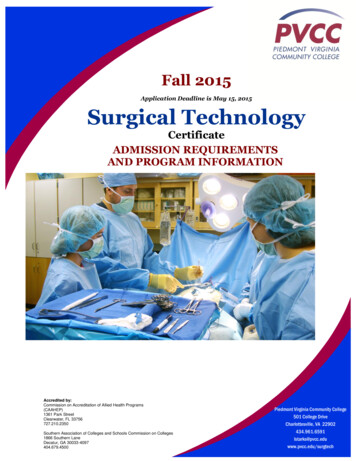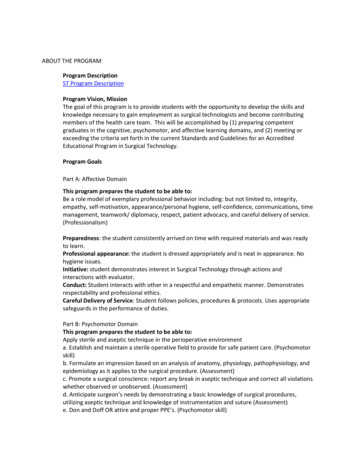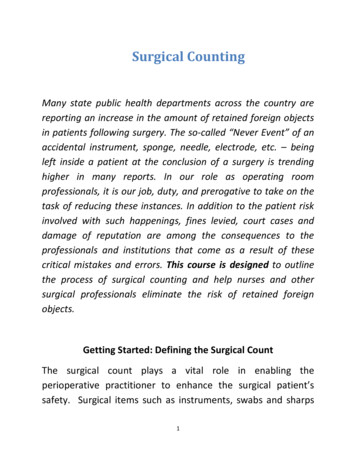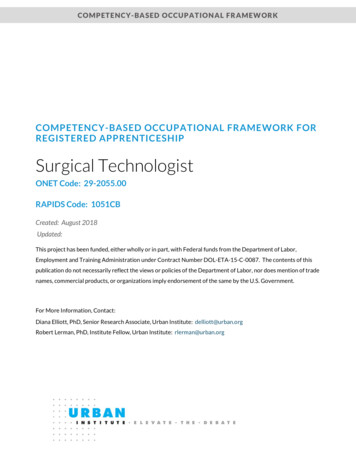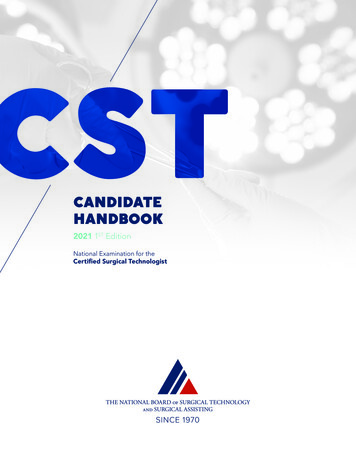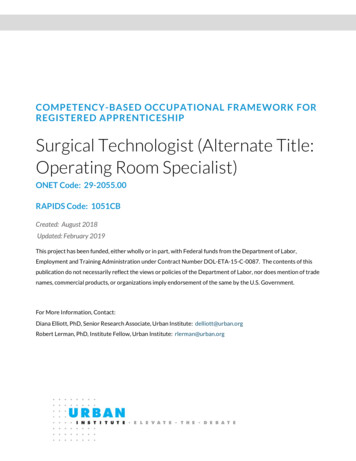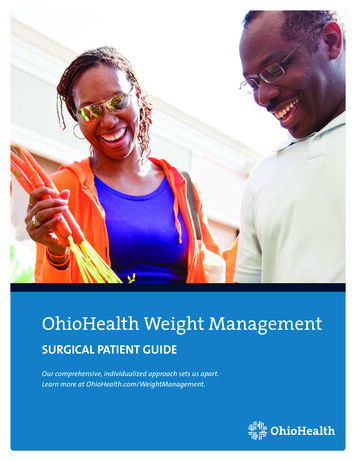
Transcription
OhioHealth Weight ManagementSURGICAL PATIENT GUIDEOur comprehensive, individualized approach sets us apart.Learn more at OhioHealth.com/WeightManagement.
Table of contentsWhy OhioHealth Weight Management is right for you. 4Meet our surgeons.5What is obesity?. 6Body mass index calculator.7Medical options for severe obesity. 8Surgical options for severe obesity. 9Laparoscopic gastric bypass. 10Why select a gastric bypass procedure?. 11The laparoscopic gastric sleeve procedure.13Risks of laparoscopic gastric bypass or laparoscopic gastric sleeve procedures.14Laparoscopic surgery – the preferred method. 15Pros and cons of two bariatric operations.16Eligibility requirements for bariatric surgery . 17Free seminars.18Presurgical evaluation. 19Surgery preparation.20Postsurgical treatment plan.21Getting started. 22Evaluation request. 25Seminar evaluation. 272OhioHealth Weight Management Surgical Patient GuideOhioHealth.com/WeightManagement3
Why OhioHealth Weight Managementis right for youMeet our surgeonsOhioHealth Surgical Weight Management can help you transform your health and life through safe,minimally invasive surgical approaches to sustainable weight loss.Bariatric Surgery and General SurgeryOur program is unique because our support extends beyond your procedure. Your care team willcompassionately guide you at every step of your journey, leading up to your surgery and afterwardas we help you navigate the physical, emotional and social effects of weight loss.OhioHealth Physician GroupOur fellowship-trained bariatric surgery physicians specialize in minimally invasive weight losssurgeries, including laparoscopic Roux-en-Y gastric bypass surgery and sleeve gastrectomy surgery.We take a holistic approach to weight loss, providing both the physical and emotional support youneed to succeed. Surgical care is provided at OhioHealth Riverside Methodist Hospital.Our strengths: A holistic approach to care. A commitment to excellence and personalized care. Experienced surgeons. Short hospital stays – patients typically return home within three days. Superior quality – surgeries are performed at OhioHealth Riverside Methodist Hospital,one of the nation’s best hospitals. Support, guidance and therapy to increase your activity level.Our surgical programWeight loss is more than an operation, and so is our program. You will be provided with: Free seminars. A thorough medical review. A presurgical evaluation. Presurgical preparation. Minimally invasive surgery. Excellent care from the Riverside Methodist Magnet nursing team. Extensive, specialized nutritional counseling before and after surgery. Postsurgical follow-up visits. Emotional and social support.Thomas E. Sonnanstine, MD,FACS, FASMBSNirav R. Rana, MD,FACS, FASMBST. Calloway Robertson, MDEducation andTrainingEducation andTrainingEducation andTrainingBoard Certification: GeneralSurgeryBoard Certification: GeneralSurgeryBoard Certification: GeneralSurgeryMedical School: Northeast OhioMedical UniversityMedical School: Northeast OhioMedical UniversityMedical School: Loyola UniversityChicago, Stritch School of MedicineResidency: OhioHealth RiversideMethodist HospitalResidency: St. Vincent’s CatholicMedical School, New YorkResidency: OhioHealth RiversideMethodist HospitalFellowship: Minimally invasiveand bariatric surgery, Tufts MedicalCenter, BostonFellowship: Minimally invasiveand bariatric surgery, Cedars-SinaiMedical Center, Los AngelesFellowship: Minimally invasive andbariatric surgery, Carolinas MedicalCenter, Charlotte, North CarolinaMedical Director Exercise guidance to increase your activity level and manage your weight long-term.4OhioHealth Weight Management Surgical Patient GuideOhioHealth.com/WeightManagement5
What is obesity?Body massBindexcalculatorody Mass Index CalculatorMedically significant obesity is defined as obesity that either is causing disease or is highly likelyto cause disease. Morbid obesity is often defined as being greater than 100 pounds overweight.More specifically, it is having a body mass index (BMI) of greater than or equal to 40.BMI is calculated as weight in kilograms divided by height in meters squared. Patients with aBMI between 35 and 40 are considered to have severe obesity and meet criteria for these operationsif they are developing obesity-related medical problems, such as diabetes, high blood pressure andobstructive sleep apnea.World health organization weight definitions Ideal weight:20–24.9 BMI Severe obesity:35–39.9 BMI Overweight:25–29.9 BMI Morbid obesity:40–49.9 BMI Moderate obesity:30–34.9 BMI Super morbid obesityBMI greater than 50The weight of Americans is increasing at an alarming rate. One out of four Americans is considered obese. Obesity is the second leading cause of preventable death, second only to tobacco use. Obesity is related to approximately 300,000 deaths per year in the United States. People with morbid obesity die eight to fifteen years earlier than non-obese people.Common health conditions related to obesity Diabetes Respiratory disease Depression Colon, prostate, breast, uterineand ovarian cancer Hypertension Joint and back pain Sleep apnea Hyperlipidemia (high cholesterol) Cardiac disease Gastroesophageal Reflux Disease (GERD) Arthritis Stress incontinence Gallbladder disease Infertility Menstrual 050061 62 63 64 65 66 67 68 69 70 71 72 73 74 75 76 77 78 79 5658606264656769717374767880828385Does not meet criteria6OhioHealth Weight Management Surgical Patient 94041424345464748495152535455565859Meets criteria if high blood pressure, diabetes or obstructive sleep apnea are 25354Meets criteriaOhioHealth.com/WeightManagement7
Nonsurgical options for severe obesityThere are many nonsurgical approaches to weight loss. They include programs that are not medicallysupervised, like Weight Watchers , Jenny Craig or self-help resources such as those found throughthe Centers for Disease Control or WebMD. Some primary care physicians may also provide medicaltreatments or refer patients to a medical weight loss program.The American Society of Metabolic and Bariatric Surgeons concluded that bariatric surgery providedas part of a multidisciplinary team is “the most effective therapy available for morbid obesity andcan result in improvement or complete resolution of obesity comorbidities.” 1 Multiple randomizedcontrolled trials have shown greater weight loss among patients who have undergone bariatricsurgery compared to those receiving conventional medical therapy.2,3,4If you are not sure surgery is right for youOhioHealth Weight Management offers an excellent, medically supervised, nonsurgical weightloss program. Our multidisciplinary approach addresses the complex nature of obesity by includingdietary changes as well as exercise and behavior modification.Our medically supervised program is designed for individuals who desire a nonsurgical option forsignificant weight loss or are not eligible for bariatric surgery. It includes one-on-one time with ourweight-loss experts – physicians, dietitians, exercise physiologists and behavioral counselors – alongwith weekly group classes. We ensure a safe weight-loss experience and provide the support andinformation needed to achieve lifelong success.1 American Society Of Metabolic And Bariatric Surgeons (2004). Consensus Statement. Available At: Http://Asmbs.org/2012/06/Consensus-Statement/. Accessed Jan 22, 2013.2 Mingrone G, Panunzi S, De Gaetano A, Et Al. Bariatric Surgery Versus Conventional Medical Therapy For Type 2 Diabetes. New Engl J Med 2012 Apr 26;366(17):1577-85.3 Colquitt Jl, Picot J, Loveman E, Clegg Aj. Surgery For Obesity. Cochrane Database Syst Rev 2009 Apr 15; (2):Cd003641.4 Maggard Ma, Shugarman Lr, Suttorp M. Meta-Analysis: Surgical Treatment Of Obesity. Ann Intern Med 2005 Apr 5;142(7):547-59.Surgical options for severe obesityThanks to advances in minimally invasive laparoscopic techniques, more and more people are selectingbariatric surgery to improve their health and begin a new life.Why bariatric surgery?Only 5 percent of people who reach the level of weight that meets the criteria for bariatric surgery achieve a significant amountof sustainable weight loss through diet, exercise or medications.Bariatric surgery can help transform your health and lifeStudies show that bariatric surgery resolves all obesity-related health problems, such as diabetes and sleep apnea, in about80 percent of patients. Bariatric surgery can be truly life changing and you will experience several benefits: Enjoy greater overall health. Minimize depression. Decrease menstrual irregularitiesor pregnancy complications. Slow down premature aging. Improve job performance. Resolve or improve your blood pressureand diabetes problems. Breathe better and sleep better. Resolve acid reflux and urinary incontinence. Reduce painful stress on your weight-bearing joints. Gain confidence. Increase your activity level and beginto enjoy normal activities again. Lower your risks for heart disease and cancer.You can achieve sustainable weight lossand become healthierMany studies have shown that patients who undergo gastric bypass surgery lose 70 percent of their excess weightwithin 12 months. Similar results can be obtained with a gastric sleeve.OhioHealth Surgical Weight Management providestwo surgical options: Roux-en-Y gastric bypass Gastric sleeve8OhioHealth Weight Management Surgical Patient GuideOhioHealth.com/WeightManagement9
The laparoscopic Roux-en-Y gastricbypass procedure It offers consistently reliable results. Many studies have confirmed this operation resultsin an average loss of 70 percent of excess weight. The top portion of the stomach is stapled closed so food bypasses it. The remaining portion becomes a smallergastric pouch the size of a small egg. The small size restricts food intake. The gastric bypass procedure resolves diabetes and sleep apnea about 80 percent of the time and resolveshigh blood pressure and elevated cholesterol about 70 percent of the time. The small intestine is divided into two sections. A 40-inch Roux limb is created from the middle 40 inchesof the small intestine. There is low risk of obesity recurrence. The Roux limb is connected to the small gastric pouch, allowing food to bypass other portions of the small intestineand reducing the amount of calories absorbed by the body.OhioHealth Surgical Weight Management selectedthis surgical option because it effectively achievessustained weight loss. Patients commonly lose 80percent of excess weight in the year following theprocedure, and sustain 50–70 percent of excessweight loss for decades.The change in anatomy can lead to several vitaminand mineral deficiencies. This problem is correctedby taking calcium and vitamin supplements. Aniron supplement also may be needed, especiallyfor menstruating women. Vitamin and calciumsupplements should be continued for life.Why select a gastric bypass procedure? There are low risks of long-term complications, as long as patients maintain adequate vitaminand mineral supplementation.Why gastric bypass worksThere are four reasons why a Roux-en-Y gastric bypass procedure gives superior results. Each of these is important,but together they provide excellent sustainable weight loss.Gastric restrictionThe size of the functional stomach decreases from a potential volume of approximately two liters to about the size of asmall egg. Because of the decrease in size, it is no longer possible to eat the same volume of food previously consumed.MalabsorbtionA portion of the small intestine is either physically or functionally no longer available to absorb nutrients, resultingin weight loss.Reduced hungerA study published in the New England Journal of Medicine suggests there is a hormonal component to this operation.Certain cells found within the wall of the stomach secrete the hunger-stimulating hormone called ghrelin. This hormonepeaks before each meal and stimulates the sense of hunger. After the Roux-en-Y gastric bypass operation is completed,this hormone no longer spikes, and presumably no longer causes episodes of hunger. This may explain why many patientsdo not feel the same level of hunger between meals they previously felt.BiofeedbackWhen patients eat beyond what is recommended, the excess empties into the small intestine where it is quickly dilutedwith body fluids, instead of being absorbed over time as it would be in a normal-size stomach with a larger reservoir.This response is called dumping syndrome. Symptoms felt by the patient in these instances include a very rapid heartbeat,upper abdominal discomfort, sweating and a general sense of anxiety. These symptoms do not resolve for at least25 minutes. Because of these potential symptoms, patients are more likely to comply with the recommended diet.Other operations address some of these components, but the Roux-en-Y gastric bypassprocedure is the only one to address all four.10OhioHealth Weight Management Surgical Patient GuideOhioHealth.com/WeightManagement11
Laparoscopic gastric sleeve procedureThe gastric sleeve procedure reduces the volume of the stomach to about the size of a small banana.Reducing the size of the stomach also reduces hunger, because the part of the stomach that producesthe hunger hormone, ghrelin, is removed.Advantages of the gastric sleeve procedure: No cutting, bypassing or stapling of the intestine. Less concern about vitamin and calcium absorption. No adjustments or artificial devices put into place.After one year, the weight loss experienced by patients who have this surgeryis normally slightly less than those who have a gastric bypass procedure.Before having bariatric surgery, I was as tiredevery morning when I got up as when I went to bed.Everything was an effort all da y long. Now I havemore energ y, and vitality. I’m happier and healthier!12OhioHealth Weight Management Surgical Patient GuideOhioHealth.com/WeightManagementIt’s made me reprioritize things in my life,and it’s been such a good investment.1213OhioHealth Weight Management Surgical Patient GuideOhioHealth.com/WeightManagement13
Risks of laparoscopic gastric bypass orlaparoscopic gastric sleeve proceduresLaparoscopic surgery – The preferred methodAdvanced laparoscopic technology allows the Roux-en-Y gastric bypass procedure to be performedmore safely. The surgery is far less invasive than traditional surgery, since it is performed throughseveral small “keyhole” incisions. Patients benefit from:Possible RiskPreventive Measure or SolutionA leak from the staple line connecting the stomachand small intestineDuring surgery, the staple lines are secured with thestomach and small bowel is checked at the end of theoperation. Excellent cosmetic results.Occasionally, this requires an urgent second operationto repair. A shorter hospital stay. Tiny incisions, resulting is less scarring and quicker recovery. Less pain. Fewer wound complications. Quicker return to physical activity. Much less risk of hernia formation.14Deep vein thrombosis: formation of blood clot in theveins of the legs or pelvis pumps and blood thinnerinjections will be used.In the hospital, you will be encouraged to walksoon after surgery, and special stockings, leg or foot.Anastomotic stricture: a narrowing of the betweenthe new gastric pouch and intestine as a result of thehealing process.This narrowing can be dilated through a scopeconnection as an outpatient procedure, if necessary.Pulmonary embolism: a blood clot that travels fromthe legs or pelvis to the heart and lungs pumps andblood thinner injections will be used.In the hospital, you will be encouraged to walksoon after surgery, and special stockings, leg or foot.If you are at high risk, your bariatric surgeon mayhave a removable filter placed in the large vesselthat returns blood to the legs, so that large clotscannot reach the heart or lungs.Incisional hernia: a defect in the abdominal wall.This is rare in laparoscopic surgery, but can berepaired with surgery.Bowel obstruction: scar tissue that creates anobstruction or intestinal blockage.Surgery can correct the obstruction.Marginal ulcerThis condition can be managed with medication,such as a stomach acid inhibitor, as well as avoidanceof nicotine and anti-inflammatories.MortalityThis is a safe operation. The risk of mortality froma gastric bypass operation is less than 0.5 percent,up to 30 days following the procedure.OhioHealth Weight Management Surgical Patient Guide Greatly reduced need for a second major operation to repair an incisional hernia.At age 57, my weight was killingme, and I had little hope forrecovery. I was taking all kindsof pills for all kinds of disorders.Four months after my surgery, myneed for medicine was completelygone! Now, I suspect I’ll be aroundto rock my t15
Pros and cons of two bariatric proceduresEligibility requirements for bariatric surgeryBoth procedures we offer are safe and effective surgical approaches to sustainable weight loss,but each operation has unique risks and benefits. This side-by-side comparison can help with yourdecision. Your bariatric surgeon will also provide guidance so you make the best choice for your situation.Body Mass Index (BMI) greater than 40, or BMI greater than 35 with serious comorbidities,such as diabetes, hypertension, obstructive sleep apnea or cardiovascular disease. Age 18 or older. You must be an acceptable medical risk (as defined by the medical evaluation).16LaparoscopicRoux-en-YGastric BypassLaparoscopicGastric SleeveRapid weight loss(12 to 18 months)Rapid weight loss(12 to 18 months)Estimated loss ofexcess weight70 to 80 percent60 to 80 percentResolution ofmedical problemsExcellent diabetes: 84 percentGoodHigh blood pressure: 68 percentSleep apnea: 80 percentReturn to work3 to 4 weeks3 to 4 weeksSupplementsVitamin and calciumsupplements neededVitamin and calciumsupplements neededAverage length ofhospital stayTwo nightsTwo nightsMortality rateLess than 1 in 200Less than 1 in 200Office visitsSix in the first yearSix in the first yearOhioHealth Weight Management Surgical Patient Guide Previous unsuccessful nonsurgical weight-loss attempts. In-person or online attendance of an OhioHealth Surgical Weight Management seminar. Review of this handbook.OhioHealth.com/WeightManagement17
Free seminarsPresurgical educationOhioHealth Surgical Weight Management offers several seminars each month to help you learn aboutour services. Each seminar is presented by one of our highly-qualified bariatric surgeons.Insurance coordinatorIn the free seminar, you will: Learn about bariatric surgery options at OhioHealth Riverside Methodist Hospital directly from our experienced surgeons. Learn the information you need to help you decide if bariatric surgery is right for you. Hear stories from past bariatric patients. Learn about the OhioHealth Surgical Weight Management program. Become much more informed about bariatric surgery.If you wish, before you leave your free seminar, you may provide health insurance information to the OhioHealth Surgical WeightManagement insurance coordinator, so we can begin to assess your health insurance coverage for bariatric surgery.Our insurance coordinator will call you to explain your health insurance benefits and answer any questions you have.If you choose to proceed with our program, the insurance coordinator will guide you to your next step.Bariatric orientationYour bariatric orientation will provide information to help prepare you for your upcoming journey. Representatives from Nutrition,Exercise and Behavioral Health will provide a brief presentation. You will receive a journal that will guide you through yourpreoperative education, surgical procedure, postoperative care and after care services.Medical evaluationIn order to make sure that bariatric surgery is appropriate and safe for you, a full medical evaluation is completed. The physicianwill do a complete physical exam, review your health history and discuss your health status with you. You also will have blooddrawn for tests, including a complete blood count, chemistry analysis, lipid profile and thyroid studies. A chest X-ray andan electrocardiogram (EKG) are ordered.If the physician feels you need additional diagnostic testing, these tests will be arranged for you at this time. These may include acardiac work-up with a stress test and an echocardiogram. Occasionally, catheterization may be necessary. Sleep studies are oftena part of this process as well, since obstructive sleep apnea is a frequent medical condition caused by severe obesity. Other studiesare tailored to your needs and only those studies necessary for your safety are ordered.Psychological evaluationThis is an important element of our program that helps prepare you for the lifestyle changes you will need to make to sustainyour weight loss after surgery. It also helps our team make a final decision about your readiness for the procedure. Duringyour evaluation, you will complete psychological testing in addition to a one-on-one interview to help the psychologist learnmore about you, and your readiness to make lifestyle changes. If the psychologist and the interdisciplinary team concludesthat counseling or other recommendations are needed to prepare you for optimal outcomes, you will be referred to anotherexperienced provider who will assist you.Dietitian consultationsOne of our dietitians will talk with you about your current and prior eating habits. They will review dietary changes you willbe required to make before surgery, and explain how to modify your food choices and portions as well as meal frequency aftersurgery to help you feel well and successfully lose weight.The dietitian will help assess your readiness to make significant dietary changes, and these consultations will help you and theOhioHealth Surgical Weight Management team make a final decision about whether or not you are ready to proceed to surgery.You will be assigned a nurse navigator and care coordinator to answer any questions or concernsyou have, and provide guidance throughout your journey.Every single person in the program has been super supportive.18OhioHealth Weight Management Surgical Patient GuideOhioHealth.com/WeightManagement19
Surgery preparationPostsurgical treatment planPresurgical consultation with your bariatric surgeonExtensive nutritional counselingOnce your preoperative evaluation and education is complete, and your health insurance approval has been received, you will have atwo-hour consultation with your bariatric surgeon and bariatric nurse. During this visit, your surgical operation will be explainedto you in detail, you will receive specific instructions. You can also discuss any remaining questions at this time.After your surgery, you will have at least three consultation appointments with the dietitian. Our registered dietitianswill help you change your eating habits and make wise choices through every phase of your program – before,during and after surgery.Follow-up visitsMedical follow-up visits will be scheduled for you with your bariatric surgeon at two weeks, four weeks, eight weeks,six months and one year after surgery. Every year following your surgery, you should meet with your physician to checkfor vitamin and mineral deficiencies.Emotional and social supportAlthough you may not realize it now, the changes you experience may significantly impact your emotions, relationshipsand self-esteem. At OhioHealth Surgical Weight Management, we offer support groups to help you manage this majorlife change.Increasing activity for long-term weight managementOur exercise program usually begins three to four weeks after your surgery, once your surgeon has approved you tobegin this activity.An exercise physiologist will design a program specific to your individual needs, including an exercise planfor you to follow at home between sessions. The process starts very slowly and gently, but you will soon be surprisedby what you are able to do! This unique feature of our program will help you achieve your weight-loss goals andincrease your activity level following surgery. Our patients are often surprised by how much they enjoy these sessions.One facility we recommend is the McConnell Heart Health Center because of the world-class, comprehensive facilitiesand highly qualified and experienced staff. For more information about the McConnell Heart Health Center, please visitOhioHealth.com/McConnellCenter.It’s the most amazing thing. I’m a new person.I have a new life.20OhioHealth Weight Management Surgical Patient GuideOhioHealth.com/WeightManagement21
Getting startedYour insurance company may require the following things to move forward with your procedure:Weight historyThis can be obtained from your Primary Care Physician, OB-GYN or any other physician where your weight has been takenperiodically. Please make this as complete as possible.Explanation of supervised attempts at weight lossThis could include working with a dietitian or programs such as Weight Watchers , Jenny Craig and any medically supervisedweight-loss programs.A letter from your family doctor or primary care physicianSome insurance companies require a letter of support. All letters must be typewritten and signed by your family doctor.Our insurance coordinator will provide you with sample letter to give to your doctor.Attending today’s seminar was your first step toward a healthier lifestyle! If you are ready for what’snext, give your completed Evaluation Request and Seminar Evaluation to our seminar attendant at theconclusion of today’s event. Our insurance coordinator will reach out to you within seven business daysto schedule an appointment. If you have any questions, please call (614) 566.2700.I would definitely recommend the program.22OhioHealth Weight Management Surgical Patient GuideOhioHealth.com/WeightManagement23
OhioHealth Weight ManagementDate of seminar:Evaluation RequestI would like to begin the evaluation for weight loss surgery.Please schedule me for an evaluation appointment withOhioHealth Surgical Weight Management.Last nameMZip codeHome phoneWork phoneCell phoneThomas Sonnanstine, MDCalloway Robertson, MDAddressStateWho was your presenter?Nirav Rana, MDFirst nameCityIn-person seminarOnline seminarMaleFemaleDate of BirthEmail address/Place of employmentSpouse’s place of employmentEmergency contact namePhoneFamily physicianPhoneReferring physicianPhoneRelationshipPrimary Insurance Inform
Residency: OhioHealth Riverside Methodist Hospital Fellowship: Minimally invasive and bariatric surgery, Carolinas Medical Center, Charlotte, North Carolina Our fellowship-trained bariatric surgery physicians specialize in minimally invasive weight loss surgeries, including laparoscopic Roux-en-Y gastric bypass surgery and sleeve gastrectomy .
